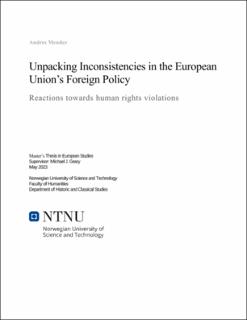| dc.contributor.advisor | Geary, Michael | |
| dc.contributor.author | Mendez, Andres | |
| dc.date.accessioned | 2023-06-28T17:21:38Z | |
| dc.date.available | 2023-06-28T17:21:38Z | |
| dc.date.issued | 2023 | |
| dc.identifier | no.ntnu:inspera:144932901:64736651 | |
| dc.identifier.uri | https://hdl.handle.net/11250/3074182 | |
| dc.description.abstract | Denne oppgaven gir en omfattende analyse av to utenrikspolitiske reaksjoner overfor regimer i tredjeland som er ansvarlige for alvorlige menneskerettighetsbrudd som en del av studiet av forholdet mellom menneskerettigheter og EUs utenrikspolitikk. Gjennom bruk av to casestudier, nemlig den humanitære krisen i Venezuela i 2017, og Saudi-Arabia: Operation Decisive Storm 2015-2019, søker denne oppgaven å forklare hvordan inkonsekvensen i EUs utenrikspolitikk for menneskerettigheter overfor regimer i tredjeland som begå alvorlige menneskerettighetsbrudd bli forklart? Det vil den gjøre ved å etablere et konseptuelt rammeverk basert på hva som driver EU til å handle i beskyttelsen av menneskerettighetene, inkludert forestillinger om legitimitet, den konseptuelle definisjonen av sammenheng og konsistens, og det institusjonelle skillet mellom mellomstatlige og fellesskapsmetoder. Gjennom valg av CFSP-sanksjoner som det viktigste utenrikspolitiske instrumentet, vil begge casestudiene vise dette skillet gjennom analyse av EUs reaksjoner, og en grundig analyse av interne og eksterne faktorer som påvirker forholdet mellom begge aktørene og en analyse av effektiviteten av sanksjoner. Denne oppgaven konkluderer med at vertikal koherens er hovedfaktoren som forklarer inkonsekvensen i EUs menneskerettighets utenrikspolitikk overfor regimer som bryter menneskerettighetene. Siden vertikal koherens utgjør en del av den mellomstatlige metoden for utenrikspolitisk utforming, er det institusjonelle skillet hovedillustrasjonen på mangelen på sammenheng mellom EU-institusjonene. Faktorer som påvirker vertikal sammenheng er hovedsakelig preferansen til medlemslandenes bilaterale forbindelser fremfor multilaterale, som undergraver EUs normative rekkevidde når de fremmer menneskerettigheter gjennom sin utenrikspolitikk. | |
| dc.description.abstract | This thesis provides a comprehensive analysis of two foreign policy responses towards regimes in third countries who are responsible of serious human rights violations as part of the study of the relation between human rights and EU’s foreign policy. Through the use of two case studies, namely the humanitarian crisis in Venezuela in 2017, and Saudi Arabia: Operation Decisive Storm 2015-2019, this thesis seeks to explain how does the inconsistency in the EU’s human rights foreign policy towards regimes in third countries who commit serious human rights violations be explained? It will do so by establishing a conceptual framework based on what drives the EU to act in the protection of human rights, including notions of legitimacy, the conceptual definition of coherence and consistency, and the institutional divide between the intergovernmental and community methods. Through the selection of CFSP sanctions as the main foreign policy instrument, both case studies will showcase this divide through the analysis of the EU’s reactions, and an in-depth analysis into the internal and external factors influencing the relationship between both actors and a analysis of the effectiveness of sanctions.
This thesis concludes that vertical coherence is the main factor which explains the inconsistency of the EU’s human rights foreign policy towards regimes who violate human rights. Since vertical coherence forms part of the intergovernmental method of foreign policy making, the institutional divide is the main illustration of the lack of coherence between EU institutions. Factors influencing vertical coherence are mainly the preference of bilateral relations of the member states over the multilateral, which undermine the normative reach of the EU when promoting human rights through its foreign policy. | |
| dc.language | eng | |
| dc.publisher | NTNU | |
| dc.title | Unpacking Inconsistencies in the European Union Foreign Policy.
Reactions towards human rights violations | |
| dc.type | Master thesis | |
